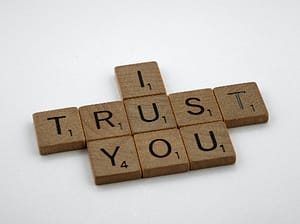One of the most essential themes that arises throughout life is confidence. Confidence generates trust, whether it be in oneself or in others. The purpose of this essay is to investigate the link between confidence and trust.
Distinction Between Confidence and Trust
It’s critical to grasp the distinction between confidence and trust. Condidence is a measure of one’s self-confidence, whereas trust is a measure of one’s faith in another. Self-efficacy, or how confident a person is in their own capacity to perform a task, can be used to measure condidence. On the other side, someone’s social preferences, or how strongly they would like to engage with others over themselves, may be measured.
People might make poor judgments due to a lack of trust and self-confidence. For example, an investor who doesn’t believe in their own research could sell a stock too soon, or an employee who doesn’t believe in themselves would accept less than they deserve. Relationships between spouses, siblings, coworkers, and friends can be harmed by a lack of confidence and trust. As a result, it’s critical to attempt to maintain high levels of community confidence and trust.
What About Trust
 When trust has been gained, it is freely offered. The higher the amount of trust, the more it has been gained. This isn’t to argue that trust can never be betrayed. It can and will be broken, but there are usually other variables at play, such as emotional neglect or abuse, in order for this to happen.
When trust has been gained, it is freely offered. The higher the amount of trust, the more it has been gained. This isn’t to argue that trust can never be betrayed. It can and will be broken, but there are usually other variables at play, such as emotional neglect or abuse, in order for this to happen.
The contrast between confidence and trust may be difficult to describe, but it becomes clearer when considering how they affect individuals.
Challenges to Confidence

People are confronted with situations that make them feel uncomfortable, invalidated, or dangerous on a daily basis. Bullying at school or encounters at home, for example, might undermine one’s self-esteem and confidence. You are not alone if you have ever struggled with your sense of self-worth.
Some of life’s most difficult situations compel us to rethink our own self-assurance. It’s simple to retain confidence when things are going well and we’re achieving, but it’s far more difficult to deal with our flaws and anxieties when we’re struggling. Things like disappointments, rejection, and criticism may all damage our confidence.
Trusting Your Judgement
Some argue that we shouldn’t trust our own judgement since we might be swayed and skewed by things like our feelings. The fact is that no one
knows us better than we do, and no one can provide us with the same viewpoints and insights that we have for ourselves. Though we do occasionally act on our emotions, this does not indicate that all of our ideas are unreasonable or illogical.
If you’ve had trouble trusting yourself, it might indicate a lack of confidence. Without confidence, it is impossible to build trust. Feel confident in your ability and stand firm in your beliefs. But be aware of when you are mistaken.
The above necessitates the development of self-assurance. That may be frightening to you. It is, however, not as tough as you may believe. Nobody is born with self-assurance. It is something that people acquire and develop over the course of their lives. You’re in the same boat. Take measures to increase your self-assurance, and trusting yourself will become second nature.
Impediments to Confidence
Fear is the greatest impediment to confidence. When you give in to your worries, you reduce your chances of developing confidence. If you don’t deal with it right now, it will get worse. You must meet your anxieties squarely in the face.
That isn’t to say you should disregard prudence and act rashly. You should take risks, but only if they will not endanger your life or the lives of others. Without a parachute, you wouldn’t leap out of a plane. Don’t make judgments based on whims. Knowing the difference is the key to confidence.
One of the most crucial aspects in attaining success is self-confidence. It is the mental state of believing in one’s own ability to achieve in a specific effort or job. Adopting a development attitude, being aware and thankful, and speaking confidently are all ways to boost your self-confidence.
How to Increase Your Self-Confidence
Begin with modest chores that you were previously hesitant to do. The majority of results will be better than you anticipated. You will never make any decisions if you try to predict what will happen and the conclusion is always negative. Take on those modest jobs without worrying too much about the outcome. That will boost your self-assurance in ways you’ve never seen before.
When you aren’t sure about a situation, you should make inquiries. It’s not about having all the answers when it comes to confidence. It’s all about knowing where to look for them and who to trust for the information you require. Any decision you make should be an informed decision. It’s also about pressing the button once you’ve accumulated enough data.
Taking responsibility for your decisions and actions is a key component of confidence. You can show your belief in what you’re doing to those who are influenced by your actions if you believe in what you’re doing. If you start blaming people when things don’t go as planned, you’ll come out as a weak person. Others will lose trust in you if this happens. Your self-assurance will fade as a result, and self-doubt will take control. Even if your decisions don’t work out, you own them when you make them.
You will immediately build your faith in yourself as your confidence grows. Then you’ll be able to do more than you ever thought.
Self-Image

Some steps to developing a positive self-image are as follows. First and foremost, don’t be too hard on yourself. Allow yourself to forgive yourself for whatever wrongdoings or regretful thoughts you may have had.
Examining all of the excellent things you’ve done in your life is another approach to cultivate a positive self-image.
A person’s self-image is a combination of their ideas and beliefs about themselves, as well as their physical appearance. Taking care of your physical appearance is another method to create a good self-image.
Read about positive contributions or achievements of others, and celebrate your own achievements. Stay on the positive side of your life!
Cultivate those relationships that have languished, or that you haven’t given a chance to flourish. Enjoying the company of others and knowing they enjoy yours is a great start to a self-image makeover.
Conclusion
Taking responsibility for your decisions and actions is a key component of confidence. You can show your belief in what you’re doing to those who are influenced by your actions if you believe in what you’re doing. If you start blaming people when things don’t go as planned, you’ll come out as a weak person. Others will lose trust in you if this happens. Your self-assurance will fade as a result, and self-doubt will take control. Even if your decisions don’t work out, you own them when you make them.
You will immediately build your faith in yourself as your confidence grows. Then you’ll be able to do more than you ever thought.

